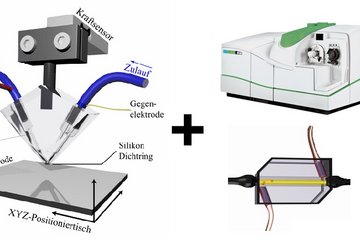All genres
41.
Talk
The Origin of Deformation-Induced Topological Anisotropy in Silica Glass. International Conference on the Strength of Materials ICSMA 19, Metz, France (2022)
42.
Talk
NFDI-MatWerk - an overview and discussion of the next steps. Webinar MaterialsWeek2021, online (2021)
43.
Poster
Fracture in the Presence of Hydrogen - Influence of the Potential. The 11th International Conference on Multiscale Materials Modeling, Prague, Czech Republic (2024)
44.
Poster
Fracture in the Presence of Hydrogen - Influence of the Potential. The XXII Brazilian Materials Research Society (B-MRS) Meeting 2024, Santos, Brazil (2024)
45.
Poster
Atomistic Modelling of Dislocation – Vacancy Interactions and Dislocation Climb. Colloque Plasticité 2023, Lyon, France (2023)
46.
Teaching
Atomisitc Modeling of Mechanical Behavior. Lecture: Lecture and Computational Lab-Course, SS24, 4SWS, FAU Erlangen-Nürnberg, April 25, 2024 - July 29, 2024
47.
Teaching
Research Data Management: Introduction & overview. Lecture: SusMet Workshop, Blockveranstaltung, MPIE, Düsseldorf, Germany, September 22, 2023
48.
Teaching
Good Research Practice. Lecture: SusMet Retreat, Königswinter, Germany, July 19, 2023
49.
Teaching
Numerical Methods in Materials Science: Atomistic Simulations. Lecture: Vorlesung & Übung, SS23, 4SWS, FAU Erlangen-Nürnberg, April 25, 2023 - July 29, 2023
50.
Teaching
Numerical Methods in Materials Science: Atomistic Simulations. Lecture: Vorlesung & Übung, SS22, 4SWS, FAU Erlangen-Nürnberg, April 25, 2022 - July 29, 2022
51.
Teaching
Computational Nanoscience. Lecture: WS 2022/2023, FAU Erlangen-Nürnberg, 2022-10 - 2023-03
52.
Teaching
Thermodynmamics and Mechanics of Materials. Lecture: Seminar, WS 2021/2022, FAU Erlangen-Nürnberg, October 01, 2021 - March 31, 2022
53.
Teaching
Pre-course on Linux and Matlab (Block Lecture) (PrepLinux). Lecture: Vorlesung & Übung, WS 2021/2022, 1SWS, FAU Erlangen-Nürnberg, October 01, 2021 - March 31, 2022
54.
Teaching
Thermodynmamics and Mechanics of Materials. Lecture: Vorlesung, WS 2021/2022, 1SWS, FAU Erlangen-Nürnberg, October 01, 2021 - March 31, 2022
55.
Thesis - PhD
Influence of Structure and Topology on the Deformation Behavior and Fracture of Oxide Glasses. Dissertation, Friedrich-Alexander-Universität Erlangen-Nürnberg (FAU) (2023)
56.
Preprint
Systematic Structure Datasets for Machine Learning Potentials: Application to Moment Tensor Potentials of Magnesium and its Defects. arXiv (2022)
57.
Preprint
The Origin of Deformation Induced Topological Anisotropy in Silica Glass. arXiv (2022)











